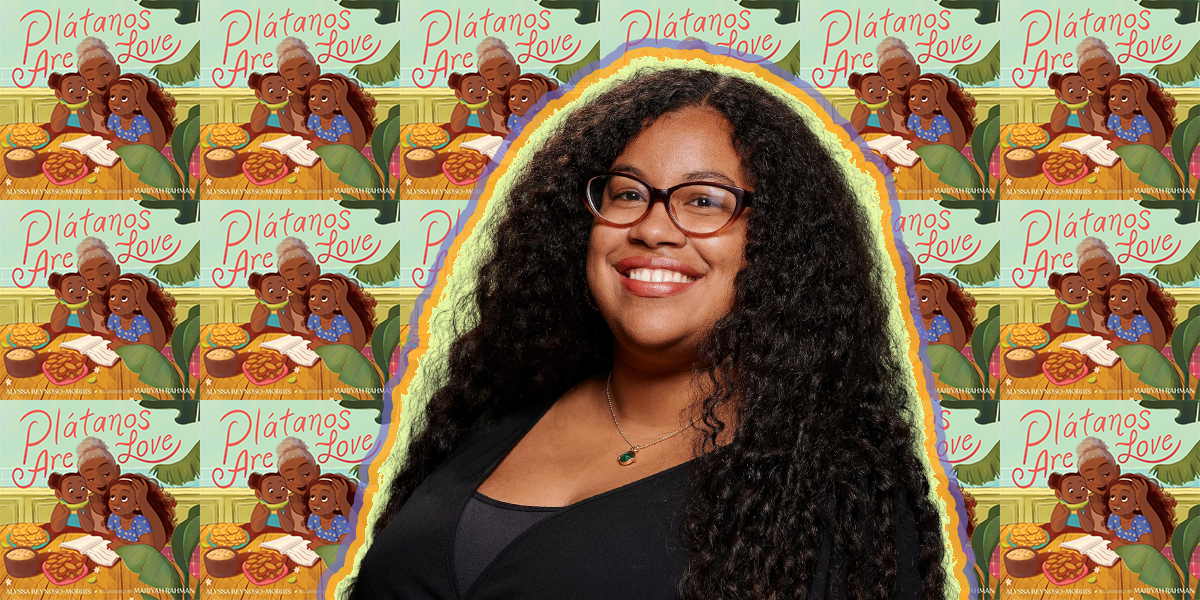Queer Afro-Latinx Dominican and Puerto Rican writer Alyssa Reynoso-Morris is the author of several picture books for children. One of her most recent projects, Plátanos Are Love, has sold over 10,000 copies in about six months and is in its second printing. It shows a little girl learning the secrets of plátanos from her grandmother, who shows her that this special fruit is an important part of her history, culture, food, and identity.
Sofía Aguilar and Alyssa Reynoso-Morris hopped on Zoom to discuss Plátanos Are Love, writing for children, and the importance of representation in children’s literature.

SOFÍA AGUILAR: What do you love about writing for children?
ALYSSA REYNOSO-MORRIS: What’s interesting about children’s books is that there are a lot of misconceptions about how easy it is to write one. Everyone is always like, “I would write a children’s book, I don’t have the time but I’m sure it’s easy.” But the joy of writing children’s books is that I get to develop those early readers. It feels great to write a book that’s a safe space for them, where they can see themselves on the page that reflects back to them. It’s also very healing for me. With kids, there’s that eternal hope and optimism and joy and infectious enthusiasm. The way kids feel loved by my books fuels my batteries to do this all over again and again.
SOFÍA AGUILAR: How did you know you wanted to be an author?
ALYSSA REYNOSO-MORRIS: When I was seven, I wrote my first book called A Good Writer and dedicated it to my mom, and I wrote that someday I would be a writer. Because I love to make books. I feel like I can go to different places. I feel proud of myself.
But growing up in a low-income immigrant household, I was told, “You can only be a doctor or a lawyer or a teacher.” Later on, I became a teacher but you have to deal with too much. Even though I loved science, I wasn’t going to be a good doctor because I can’t do blood. So I went the political science route and was going to go to law school, but didn’t because I graduated at the tail end of the recession and couldn’t find a job to support me while I went to law school. I knew I wanted to help people. So I went into the nonprofit sector and held many positions including event coordinating, fundraising and development, and program management.
The way kids feel loved by my books fuels my batteries to do this all over again and again.
Alyssa Reynoso-Morris
But I was always writing and it wasn’t until I was putting together my daughter’s library that I realized there was still not enough diverse representation. I did research, learned the structure of writing a picture book, got into mentorship programs, and kept writing. It was quite a journey over the last six years of deciding that this is what I wanted to do for the rest of my life.
SOFÍA AGUILAR: Who were the authors who influenced you?
ALYSSA REYNOSO-MORRIS: My early influences were Julia Alvarez and Sandra Cisneros. I’m glad there are more now like Tami Charles, Meg Medina, and Angie Cruz. But I didn’t see that much Afro-Latina representation. Growing up, I only spoke Spanish at home and I didn’t see myself in the books that I read. There were pieces of myself but my experience as a Black Latina was missing. We’re not a monolith. There is a lot of diversity within the Latina community and I wanted to fill that gap.
SOFÍA AGUILAR: I know you have a young daughter. Would you say motherhood has influenced your writing or creative practice?
ALYSSA REYNOSO-MORRIS: It’s great to be able to do my research with my daughter as my research buddy, picking out new books and reading them together. She’s definitely a part of my brainstorming process and my research process. She’s also my toughest critic. I’ll write something in the early stages and read it to her, and she’ll say, “Eh, I don’t know.” Or, “Mommy, I don’t understand this.” So I know I have to dig deeper and make it more clear. My writing is very lyrical and poetic and sometimes kids gravitate towards the more funny stuff, so it’s a good challenge to reframe the way that I typically write for her lens. And if she gravitates toward it, I know I have something good. And I would say it worked because so far at all of my events, the kids are coming up to me and they’re telling me that they love the book just as much as the adults. So it’s working.
I hope they find this book… I hope that they know that there’s someone in their corner who loves them because that’s what books were for me.
Alyssa Reynoso-Morris
SOFÍA AGUILAR: What do you hope readers – young and old – take away from Plátanos Are Love?
ALYSSA REYNOSO-MORRIS: Growing up, some of my fondest memories were with my grandmother, and she was my biggest influence. I wanted to immortalize her memory and legacy. So for me, I want my reader to feel something. I want my readers to know that they matter, their culture matters, the food they eat matters, their experiences matter, their family loves them and cares about them, and they deserve to see themselves and their culture on the page.
Kids are going through challenging situations and might not feel supported and loved at home or in school. So I hope they find this book. I hope my book finds them and that they can at least feel safe in the pages of the book. I hope that they know that there’s someone in their corner who loves them because that’s what books were for me.

Order Plátanos Are Love in English or Spanish, and follow Alyssa on Instagram.

